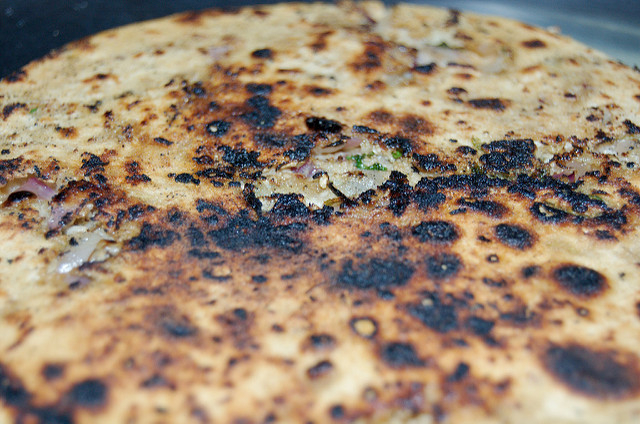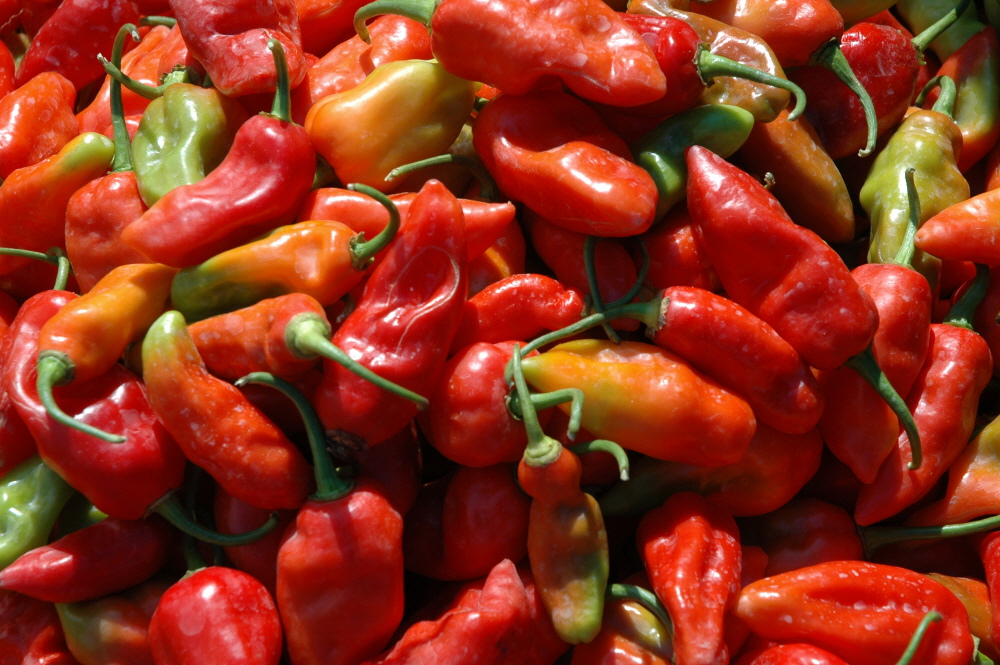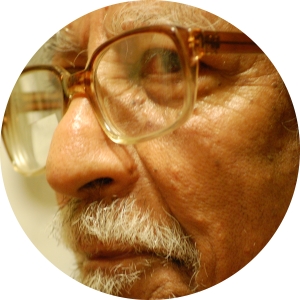When her father had become mad, the company had told him that the best they could do for him was to keep him on as night watchman on the plantations, pending repatriation to India, and that exceptionally he would receive his ration of rice, dhal and oil and occasionally some lengths of cotton, but that he was not entitled to any money. She was barely five when they had arrived on the Hesperus, and it had been nothing but misery piled upon misery ever since. Because the rations were meagre, and needed to be supplemented by buying a few things from the company shop, they often had but one meal a day, and many a night they went to bed on an empty stomach, holding each other tightly for comfort, he rubbing her belly, in a futile attempt to keep hunger at bay. Still, they had survived with the help of some well-meaning people, often very poor themselves, but who still found a coin or a banana for the starving pair. Sadly their condition did not leave them immune to the malevolence of certain folks who lifted their noses at them and manifested clear hostility.
At first Baba knew who she was, and the one thing which seemed to bring some cheer to him was when she appeared in front of him, when his eyes would light up, and he would mutter some indistinct words of which only meri rani , my queen, stood out clearly. He would hold her tight, and then invariably his tears would spill out. Officially he was the night watchman. At first he seemed to know what he was meant to be guarding, but gradually he completely lost touch with reality, often chasing invisible burglars, but they only kept him on because Devi slept by his side, and they imagined that one of them had the wits and the other the brawn to handle potential burglars. Fortunately there was never any major burglary, which suggested that the unusual combination was working after a fashion. At least in the early years.
When Devi turned eleven, (having been forgotten by the authorities, they had still not been repatriated to India,) a major burglary occurred and the company said that it had no alternative but to sack them. The Indian indentured labourers who had come to the country at the same time were very kind to father and daughter, but they had very little resources themselves and although they would not let them starve, the little that they could afford to give them was often insufficient. At first the only thing Devi could do was to go out begging.
An Indian landowner saw her in the streets with a begging bowl one day, took pity on her, and asked her if she wanted to come work for his family. That was a Godsend, because most people were themselves poor and she readily agreed. Babaʼs erstwhile friends decided that he should be put in the hands of the Pandit at the Mandir. The Mandir was only a small one, but the government had, in a fit of generosity included a sizeable parcel of land in their official grant, as a sop to the growing population of East Indians, who were becoming increasingly important. And vociferous.
The Pandit had got some of the faithfuls to build a wooden fence around it, and allowed a few destitute people, suffering from old age or sickness, to squat under a unique banyan tree with roots extending over fifty yards, and had even provided sailcloth to make a kind of shelter with, in case of rain. Although he was known for his generous nature, he was in no position to feed those needy folks, so he demanded that the people he allowed on his patch fend for themselves, meaning that they should do the only thing open to them: beg. His one rule was that he would not provide any food for anybody, whatever the circumstances. There are only twenty four hours a day, and the work of the Lord comes before the needs of man. But he allowed them to grow vegetables wherever they found space on the compound, but for one thing, the land was sandy and not very suitable for cultivation, and for another, there was a lot of bad blood between the inmates. Still it was helpful.
Panditji was very strict in enforcing his rules. Only for feasts like Divali or Holi would he solicit subscriptions from the better off among his flock, in order to bring some cheer to those unfortunate souls. But he did encourage his faithfuls to think of the poor and help them directly, and they did.
Shri Renghanadan Pillay, a landowner, was one of the early migrants who had come from Madras. He and his wife had worked on the sugar cane plantations, and had seized the chance of making some money by raising chicken on the little compound where they and ten other families had their huts. They had been very careful, and at the end of their indenture, they had started a small poultry business which had flourished. He must have been an astute businessman, for he had ended up buying some land started growing sugar cane, and a mere twenty years after he had arrived in the colony, half-starving, with not even the clothes on his back belonging to him, he was one of the richest Indians in Demerara. His wife had died and he had married a much younger woman. He had been touched by the sight of this ill-fed little girl begging.
Devi thought that the new Shrimati Pillay was like a princess. When God took Mama away, she was only seven, but she remembered her vividly. Baba, although he had lost his mind, was not wrong in saying that she was like a queen, now this Captanine Radha was also like a queen. Shri Renghanadan clearly worshipped her and she could do exactly what she liked with him. He never said no to her slightest whims. Devi found her kind enough, but she did not think that she had ever met a lazier woman in her life. She sat on a deck chair in the sun all day long, and it was always Devi do this, Devi do that, bring me some laddoo, Devi isnʼt it time you made some chai for me? Put plenty of sugar. I am so tired, I have no energy.
She would have preferred sleeping under the banyan tree with Baba, but the Shrimati said she should sleep in the specially built servantsʼ quarters, where she was given a small corner all to herself in a room where provisions were kept. She loved onion in her food, she reflected wryly, but not in her nostrils.
There were also a gardener and his wife who doubled up as cook. They asked her to call them Chacha and Chachi, uncle and aunt. They were all both kind to her, and Chachi Padma taught her to cook.
She lived a whole year like this, visiting Baba every other day, sometimes bringing him some food that she had slyly put aside for him with the connivance of Chachi Padma. Unfortunately Shri Renghanadan had a strange belief about wages.
ʻI am the most generous person in the world,ʼ he told Devi, ʻask my Anuradha, she only has to look at something and the next day I have bought it for her.ʼ Devi knew that to be true. ʻThen why am I only giving you fifty cents a day for your work? Tell me?ʼ Devi shook her head.
ʻIs it because I am a wicked man?ʼ Devi shook her head violently. He was not a wicked man.
ʻYou said it! In fact I am a kind man,ʼ he said. Devi nodded without any great conviction.
ʻYou see?ʼ he questioned an invisible presence on his left. ʻI will explain, listen carefully. I came in this country with nothing, and I worked on the plantations. I got next to nothing, the rice, the dal, the oil, the onions, and every year some white sheeting, and a very small amount of money, half a pound a month, or later three dollars.ʼ Devi listened very carefully, she always did, but she did not see where this was going.
ʻNow, I ask you one question, did this do me any harm?ʼ Devi knew that she was expected to say no, and answered in that sense. You see, Renghanadan again said to that invisible presence on his left. ʻYou are a very sensible girl, and you will go far, mark my word.ʼ And turning to the left, he added, ʻI mean this. Now, why am I telling you all this,ʼ he asked. Devi was not sure what to say, but fortunately he was not expecting an answer. ʻThere is no greater harm you can do to people than to spoil them… it makes them,ʼ turning to the left moving his hand round a few times, he asked, ʻwhatʼs the word?ʼ The invisible spirit must have whispered it to him, but Devi did not hear what he said.
ʻComplacent and lazy.ʼ Devi still did not catch his drift, but the rich man must have seen the perplexed look on her face.
ʻIf I paid you more, and Bhagwan knows I can double your wages and not feel the pinch, I will not be doing you a favour.ʼ I must be stupid, thought Devi, I donʼt understand how you can be doing someone a favour by not giving them a proper wage, but she did not have to wait long for illumination. ʻOnly when you struggle and sweat, can you reach your…ʼ Renghanadan pursued, turning to the left, but not waiting to be told this time, for he turned back immediately, ʻFull potential!ʼ It dawned upon Devi that she was not getting that increment that he had promised some time before.
ʻThen I will have to steal some more, if I am to stop Baba starving,ʼ she thought and smiled. At that very moment, Shrimati Anuradha called aloud, ʻWhere are you Devi, come massage my feet, I am so tired.ʼ
ʻComing, captanine,ʼ said Devi, wondering why somebody who did nothing all day was always more tired than those who woke up with the birds and went to sleep after ghosts started roaming abroad. Could this be what the boss was saying?
For a year it went on in much the same way. Shrimati Anuradha was becoming more irascible. She often had headaches and Devi was expected to give her head massages, shoulder massages, foot massages whenever she had a free moment.
As if all the work done in the main house was not enough, the Chacha gardener who was a soft spoken and kindly man would often come towards her, all smiles, his head moving left and right, like the pendulum of the big clock, but swinging the wrong way.
ʻBeti,ʼ he would say, ʻyou are such a sweetie, your Auntie Padmaʼs back is paining so much, please come and rub her. Everybody says you have the fingertips of Parvatti herself.ʼ Devi had no idea who or what Parvatti was. One day she asked the old gardener, and he looked puzzled, ʻI donʼt really know, I thought…ʼ and could not find the words to express that profound thought. I am developing big muscles, Devi thought wryly, what, with all the massages, the running all day long and the kneading for the parathas which the boss and his young wife liked so much.
 Photo Credit:
CC-BY-SA Scott Dexter
Photo Credit:
CC-BY-SA Scott Dexter
Parathas! It was the paratha which undid her in the end. She did not enjoy stealing, but she cried when she thought that whilst she was well fed, albeit with leftovers, she could not provide for poor Baba. The poor man was always hungry. In the compound of the Mandir, there were bananas growing, but the Pandit had the habit of counting them, and had threatened that if only half a fruit was missing, he was sure to catch the culprit and would have the painful duty of evicting them. Devi wondered whether there was a single individual living under the banyan tree stupid enough to risk incurring the wrath of the Pandit by stealing only half a banana. When there was a good crop, the Pandit said, he would himself bring some to his ever hungry guests, but let no one take advantage of his kindness! In any case, Baba did not like bananas.
Devi would quite regularly put a few things away to take with her when she went to see him: a piece of fried fish, some rice wrapped in banana leaf, a coconut, some cooked dal, whatever she could lay her hands on. Chachi Padma would smile knowingly. She had even given her an aluminium catora with a lid for the dal which was tricky to carry. But Devi noticed that when the old Chachi saw her putting things away, her back aches became more severe. Anuradha had often expressed surprise when she saw the contents of the dekhchi, saying that she was sure that there was much more of that chicken curry last time she checked. She would look at Padma and Devi sharply. Accusingly.
ʻI am not saying anything,ʼ she said, ʻI have no proof, but the day I catch anybody stealing from me they are out on their ears.ʼ
ʻShrimati,ʼ Padma lied, ʻI would never dream of stealing from you, I am a very pious person and I am knowing what a great sin it is to steal… Iʼd never steal food even if my children were starving.ʼ
ʻAnd what have you got to say, Devi?ʼ
ʻI am a very pious person too, Captanine,ʼ she said, not sure what pious meant, ʻI would never steal even…ʼ and trailed off.
ʻDonʼt say that I have not warned you. If you need anything, just ask, I am a good pious person, I will not refuse.ʼ Another pious person, mused Devi wryly.
ʻI will look this word up in a dictionary,ʼ Devi would have said if this was a hundred years later, and she had a dictionary. The two servants looked at each other uneasily, and the lady of the house stormed away. They could hear her angrily telling her husband about thieving and ungrateful servants.
ʻIt is you,ʼ Padma said to Devi, ʻwe are only taking a few things, but you, young missy, you are thinking this house is belonging to you, and serving yourself shamelessly. Now because of you I am in trouble.ʼ Devi did not cry easily, but this was the first time Chachi Padma, who had always so good to her had said those unkind things.
ʻItʼs my Baba, he has nothing to eat, what am I to do?ʼ Chachi Padma was sorry she had spoken.
ʻI know, beti, I know… we the poor have been put on this earth to suffer… I am sorry, but be careful.ʼ
A week later, Devi was helping Padma making parathas. She liked rolling out the kneaded dough into nice round flat cakes which Padma would then roast on the tawa, a thick cast iron griddle. Anuradha, attracted by the aroma of paratha beginning to cook in a generous dollop of ghee, rushed in the kitchen and laughingly said she could not wait any longer, she had to have a taste right away. Padma was overjoyed, she loved being appreciated. With a nice flourish she tossed the flat bread over with the wooden spatula so as to let it cook on both sides, and Anuradha moved up and down in the kitchen like an excited child. When the mistress chef was satisfied that her product, now bejewelled by a constellation of dark burnished gold patches on both sides was fit for a rani, she put it on a plate and presented it to the lady of the house with a little bow.
When they were serving dinner later, Padma carried the chicken korma and Devi the parathas. They had placed everything on the table and were preparing to go out when Anuradha called them back. Devi understood right away what the problem was, but hoped that the mistress was not going to make a big deal out of it.
ʻWhatʼs this?ʼ she asked pointing to the plate of parathas with her chin. The two servants said nothing.
ʻWhen I came to the kitchen, I counted how many rolled cakes there were, and I can see that there are four missing. Padma?ʼ
ʻI donʼt know what you are saying, captanine, I —ʼ Devi did not let her finish.
ʻCaptanine,ʼ she said in a clear untrembling voice, I took them, it was I.ʼ She was a quick thinker, and thought that there was no point in them both being sacked. ʻI put them away, to take to my father.ʼ
ʻArrey whatʼs a paratha… rani…ʼ said Shri Renghanadan, whereupon the wife turned on him.
ʻWhatʼs a paratha, you ask? Today it is one paratha, tomorrow, it will be the whole house… This is defiance! Only last week I told this girl you picked from the gutter that I would kick her out if I caught her again. This is not the first time, you know, I said, if you want anything, just ask. Did she ask? No, these types of people, prefer to steal.ʼ Devi was singularly unconcerned; worse things had happened to her and Baba. The young wife was in full flow, ʻTake your things and leave this house immediately, do you hear?ʼ
Since she was being kicked away she might as well take those two wretched parathas that she had hidden away for Baba, she thought. She was surprised with her own calm; the events had not taken her by surprise and she would take things in her stride. Chachi Padma gave her six dollars, half her savings and they had a good cry for a short while. She was the nearest thing she had for a mother, and she would miss her as much as she would miss her meagre wages but she was not one to waste time over the inevitable.
 Photo Credit:
CC0 micahernandez
Photo Credit:
CC0 micahernandez
Wearily she made her way to the Mandir. She regretted the fact that Baba would not even understand what had happened. She thought he looked surprised when he saw her. She had bought a few sweetmeats from an old lady she knew who made mithai to the rich families; she used to be sent there by the Anuradha who had a sweet tooth. Baba gave the sweets a vacant stare but when Devi put a piece of laddoo in his mouth, he smiled and began to chew, and opened his mouth like a child to receive more.
ʻI have been given the sack, Baba,ʼ she told him. He kept munching as if he had not heard.
ʻI have also got two parathas for you… well one is actually for me… here, have it, itʼs nice with the laddoo.ʼ When she gave him the paratha, he grabbed it and tore a big chunk of it and began chewing lustily. She had tears in her eyes as she watched him eat; he seemed so happy, he who was so rarely happy. ʻI have no idea what I am going to do now,ʼ she told him. The idea that they could both go and walk down a cliff occurred to her, but it scared her so much that she chased it away with all her might.
ʻDonʼt worry, Baba, we wont throw ourselves over the cliff, we’ll manage,ʼ she told him, for a split second half believing that he could read her thoughts.
Normally, around this time one of the two women, Anuradha or Chachi would require her to do a massage for them. She smiled to herself, thinking, at least I am being spared that. But a thought occurred to her and she immediately acted upon it.
ʻBaba, I need to give you a massage now.ʼ The poor man understood and smiled, and moved a bit to allow her to go behind him. She put her hands under his torn shirt. I must repair that shirt, now that I shall have plenty of time, she thought. She grabbed a lump of flesh in each hand, the poor man is becoming a sack of bones, she thought, and began to knead it. I could be kneading atta flour, she thought and grinned. Baba closed his eyes, saying nothing, but she remembered vividly how when Ma served him a lota of mango juice that she had squeezed for him, mixing it with some crisp onions fried in ghee, he would sip this, making the greatest possible noise, closing his eyes, saying to her, ʻBeti, your Ma knows how to make me pass through the gate of Amarawati. (ʻWhat is Amarawati, baba?ʼ ʻA place where nice little girls like you go after they die. Our paradise.ʼ ʻI donʼt want to go to Amarawati, Baba, I want to stay with you.ʼ )
Early next morning, as it was Friday, she went to the little Mosque which the Musselmans of Georgetown had built. She knew that they would be going there in droves for their prayers, and that on that day, many of them had some coins for beggars. Indeed she was quite pleased with what they gave her. On a good day it was not impossible to collect fifty cents, a day’s wage. On other days, she went on the main road and walked up and down, sometimes sitting in a place where she thought she could catch a few rich people. Some gave her a cent or two, many shooed her away angrily. The takings were very meagre, but come Friday she got a little bit more.
A nice bearded man in a flowing robe had given her five cents once; he had smiled and patted her gently on the head. The same man recognised her a week later, and asked if she would like to work as a maid at his house. She was overjoyed.
ʻBut one thing, you are Musselman, yes?ʼ he asked. She shook her head sadly. The man pursed his lips for a while, and turned his back to go away, but at the last moment, he looked at her again and smiled. ʻNevermind, come with me.ʼ He took her home and called his wife.
ʻMaimoun, I have brought a maid for you.ʼ The lady called Maimoun came in smiling, wiping her hands on her horni. She was a bit plump and very motherly.
ʻWhatʼs your name, little girl?ʼ she asked kindly.
ʻDevi, captanine.ʼ
ʻAt the moment she is a cow worshipper, but she will become a Muslim,ʼ the man told his wife. ʻWonʼt you?’ Then he earnestly explained to Mrs Maimoun that in the eyes of Allah, showing the light to an idolater, and putting them on the righteous path earned the benefactor as many sawabs or credits as if he had built a whole masjid by himself.
Devi was not sure what that meant, but smiled and nodded. ʻWe will call her Aisha, like the daughter of our prophet Muhammad, on whom be peace!ʼ
ʻYou can sleep under the table in the kitchen,ʼ the man said, adding, ʻthe captanine will give you a mat and a blanket.ʼ She found that the lady Maimoun was very kind; she did not expect her to eat leftovers, but said that she could eat the same as them. She helped her in the kitchen, at first, only cutting vegetables and kneading flour for rotis, but soon she trusted her enough to let her have complete responsibility, specially once it was established that she was a good cook, the training that Padma had given her proving invaluable.
 Photo Credit:
CC-BY-NC-ND Commonwealth Secretariat
Photo Credit:
CC-BY-NC-ND Commonwealth Secretariat
They were also giving her a little bit more money than did Renganadhan. As the only servant she was a bit lonely, but the captanine was very kind and liked to chat.
Unfortunately this happy state was not to last. One day, Maimoun had gone to visit a sick friend, and she was alone with the Master. He had gone on a trip out of town, and had been away for two days. She made him some tea and he said that after his tiring trip he needed her to bathe his feet. She boiled some water, carried it to the back verandah, poured some in the basin and went to get some cold water in case the hot water was too hot. He patted her gently on the head.
Aisha, he said, you are a good girl; we really must get a Miaji to teach you about your new religion. And he made a big speech explaining how much better Islam was than the religion of Hindus who worshipped stones and whose gods were monkeys and elephants. In our religion, he explained, we are all the same, we do not have Chhamars and Brahmins, all Musselmans are equal. Devi smiled, doubting very much whether the likes of her would benefit from more equality under any system, whatever equality meant.
Now wash my feet gently. She proceeded to massage his feet, adding more hot water as the water in the basin cooled down. He bent down suddenly, and gently pulled her hands up, so she could massage his calves. She had never done this but it did not bother her.
ʻYouʼve got a nice gentle touch,ʼ he said, stroking his florid greying beard. She smiled. ʻAre you happy here with us?ʼ She nodded. He patted her on the head. He bent down and pulled her hands above his knees.
ʻMy thighs are also very tired, I walked too much these two days.ʼ This gave her a slight feeling of unease, but she did as he expected, kneading his thighs with both her hands.
ʻHigher,ʼ he whispered. It was a hesitant inflexion in the whisper which alarmed her. Chachi Padma had told her that men sometimes had funny ideas, but she had taken this to mean younger men, not those who had nice white beards. She suddenly noticed that he had a hard on, and he noticed that she had noticed. She did not understand the implication of this expansion, but instinctively felt that it was not a welcome development.
ʻYou donʼt have to tell Begum Maimoun about this, I will give you one dollar,ʼ he said, directing her hands towards his erect member. Her body grew cold. Suddenly she drew back, knocking the basin of water. He made an attempt to grab her, but she was too quick for him. She was out of the house, and ran all the way to the Mandir. By the time she got there, she had stopped trembling. She had not shed a single tear.
For the first time in her life, she felt that she could not confide in Baba. He expressed no surprise and smiled at her muttering some indistinct words. It was the Pandit who, on seeing her asked if she was not working, and she said that she had been sacked.
ʻDon’t tell me, you misbehaved?ʼ
ʻNo, Panditji.ʼ
ʻDonʼt lie, I think you must have.ʼ The saintly man was deep in thought for a bit, then nodding to himself he said, ʻBut if you promise me that you will be a good obedient little girl, I might get you a good post, would you like that?’
ʻYes please, Panditji.ʼ But he did not refer to that again in the next weeks. She had no alternative but to go back to begging, and father and daughter survived like this for a whole year.
ʻYou remember what I told you,ʼ the Pandit said to her one day, ʻI said that I will find you work? Was last week, no?ʼ She did not tell the holy man that it was more than a year ago, and nodded silently.
The Pandit had found her work with another rich landowner, but the lady beat her for nothing. When the Pandit asked her if she was happy in her new job, she told him about the beating and this really made him very upset.
‘What is this world coming to? I took pity on you and got you a good position, and instead of getting thanks what do I get? Reproach! You thought fit to up and go because of a little beating? What did you expect, that the lady of the house would sing to you and rub your back? Never again will I waste my time!ʼ And he turned his back on her and walked away in disgust.
 Photo Credit:
CC0 remilozach
Photo Credit:
CC0 remilozach
She found work with an English doctor who was attached to a big sugar plantation. He had a wife and two children, and Devi was very happy with them, and was able to learn a little English. They were kind people, and it was the happiest she had been since she landed on these shores. They paid well and she was able to provide for Baba, buying him new clothes and plenty of mithais. Sadly his teeth were rotting away, but he had so little joy in his life. The doctor left the area after three years and she was once more without a job. Fortunately Maimoun Begum had taught her to be careful with money, and she had carefully kept her savings in a tin which she buried in the night, near Babaʼs banyan.
It was Chachi Padma who found her a good job at Shri Ramnathʼs. She said that he was perhaps the richest Indian in the country, and had a few houses which he rented out, mainly to expatriates and that he paid well. So Devi went to the house, knocked on the door of the huge house, and was told that Shri Ramnath was not going to be home until the afternoon. She sat under a mango tree all day long, waiting for the master to come home. When he arrived, he went to take a bath and do his puja and it was dark before he came out to meet her. Yes, he would be happy to give her a position, he said, and she was engaged; the wages seemed fair.
The work was pretty hard, but she was never afraid of hard work. The lady of the house was a cheerful old soul who was always chewing betel and spitting it out all over the place, but she was harmless. Ramnath had an eighteen-year old son, Jagdeo, who had gone to a school for white boys where they allowed a few rich Indians in to make up the numbers. Ramnath proudly told everybody that his son was going to London to become a doctor.
Devi thought that Jagdeo was a handsome young man, but he was very haughty. He never said things like, ʻPlease get me some milk,ʼ but ʻEh you girl, go get me some milk, and be quick, I havenʼt got time to waste.ʼ At least nobody hit her, and she was never afraid of hard work.
She noticed right from the beginning that although he spoke to her harshly, he liked to leer at her, and she lived in fear of the day when she would find herself alone with him. And that day came all too soon. The parents were away, but Satish the cook, as well as Rashid the mali were about. She was helping the cook, when the young master came into the kitchen.
ʻWhat are you cooking today, Satish? he asked. ʻChicken, master Jadgeo.ʼ
ʻToday,ʼ he said, ʻI donʼt feel like chicken, I want fish.ʼ
ʻO.K. I go go cook fish, we buy this morning, I was going to fry them for tomorrow.ʼ Jagdeo shook his head. He looked at Devi, and said that what he really wanted was goat meat.
ʻIn that case, master Jagdeo, I go go buy some.ʼ
ʻThen go go, you numbskull, what are you waiting for?ʼ Satish bowed and hurried out. Devi was beginning to tremble with apprehension. Next, Rashid the mali was soundly rounded upon because, Jagdeo said, the roses were a bloody disgrace. Go sort your mess out, he was ordered. Devi knew that he was sending him away as far as possible from the house for a specific reason. The mali had no option. She knew that there was trouble ahead, and would have run away, but she did not wish to lose another good job. Maybe the young master just wanted to tease her.
He looked at her with a wicked smile which said, now you are in my power. He looked intently at her.
ʻYou are, a pukka jadoogar, enh!ʼ
ʻNo sir.ʼ If I knew any magic, she thought, I would use it to protect myself from you.
ʻI know what you are after.ʼ
ʻI am not after anything, masterʼ she said looking at his feet.
ʻWhat are you looking at me like this? Remember who is the boss who the servant.ʼ
ʻYes sir, I always remember.ʼ
ʻCome here,ʼ he ordered. No power on earth is going to make me take one step in his direction, she swore to herself. He rushed towards her, grabbed her with one hand and pulled her to him. With his free hand he grabbed a knife, smiled at it, and twisted it playfully with his fingers.
ʻYou shout, and I swear I will put that knife in your heart.ʼ
ʻPlease let go of me, Mr Jagdeo.ʼ
‘No, I will give you what you have been after ever since you came to work here, you witch.ʼ
ʻI have not been after anything, Sir.ʼ She surprised herself at how calm she was. Next thing he hit her across the face, not once, but a few times, almost playfully, and she felt all her energy drained out of her; she could hardly stand on her feet. Then he became all tender and apologetic. He did not want to hit her, he was just teasing her, it didn’t really hurt, did it? he was not a brute, but she had made him crazy for her, and now she was pretending that she did not want it. He knew what girls were like, they played hard to get. She should be flattered, not offended, after all she was a servant girl and he the son of the richest man in Georgetown. She was limp and trembling all over now, vainly trying to kick, but her muscles would not obey her. She was unable to do anything and he lifted her sagging body and carried her to the bedroom. He took off her clothes and she had no strength to resist him. Were it not for Baba, she would have preferred death. He expressed admiration for her body, and she cursed the body which could attract such obscene passion. Who would have thought such a little treasure would be hidden under those filthy rags? He took off his trousers and threw himself on her and raped her, said he wanted to marry her, then raped her again and again.
Anuradha was shocked to see the young woman dripping blood from her thighs appearing at her gate. She was very impressed by the fact that although she was unable to keep her tears inside her eyes, the victim herself was dry-eyed. She would tell her husband later that it was her fault; had she not sacked the girl for stealing two miserly parathas, this would not have happened. The doctor was be sent for, and Shri Renghanadan kept urging him to prescribe any drugs that would help her, that he would pay for them whatever the cost. He had plenty of money, he explained, and believed that human life, even of the lowest type of people was sacred. Chachi Padma repaid some of those head massages by watching over Devi, putting cold compresses on her fevered brow. At first the doctor had expressed shock and advised police action, but when he heard that it was Ramnathʼs son, he changed tack, and said that since what had been done could not be undone, it would be best not to make a big deal of it. After a week, Devi seemed fully recovered, and Anuradha promptly offered her the old job, but she said no, she needed to look after her Baba.
A year later when she met Mr Ramnath senior, who was completely unaware of what had happened between his son and the girl, he told her that she was a naughty little girl for leaving a good job without telling anybody. It was my Baba, she lied, he was suddenly taken ill. But I always liked you, he said, adding that he was looking for a cook for an Englishman to whom he was renting the house on the riverside, that he had recently finished building. He asked if she would like to work there. It was up to her, he said, but advised her to hurry. I would rather die than work for that man again, she thought.
ʻIs he better now,ʼ asked Shri Ramnath as he started walking away.
ʻWho?ʼ she asked.
ʻYour Baba.ʼ
ʻMy Baba has never been ill,ʼ she said without thinking, but suddenly remembering her white lie, she quickly added, ʻsince.ʼ It took her no more than one minute to change her mind. The old man was not responsible for his sonʼs crime; he was in fact a sweet old dear. Yes, she would work for the Englishman.
 Photo Credit:
CC-BY-NC-ND Allan Hopkins
Photo Credit:
CC-BY-NC-ND Allan Hopkins


